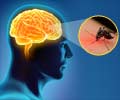Several Massachusetts residents are feared to have contracted the potentially deadly Eastern equine encephalitis. Many call for mosquito sprays.
Eastern equine encephalitis (EEE) is spreading fast in Massachusetts, resulting in calls mosquito spraying, though environmentalists seem to have reservations.
EEE is a potentially deadly encephalitis. Though the incidence is rising, authorities are reluctant to go in for wholesale because of objections from environmentalists.Nine regional control projects in the state spray for mosquitoes. Most of the time, the Norfolk County Mosquito Control Project, which uses the aerosol pesticide Anvil, sprays only if a homeowner requests it, according to assistant director David Lawson.
Plymouth County has a similar program. But during a health threat, the project sprays regardless of whether calls come in, Lawson said.
Although environmental advocates have protested the pesticide spraying -- saying the chemical could wreak havoc on aquatic ecosystems and taint organic farms -- state officials have argued that it's worth it to protect residents from the EEE virus, which has killed six people in Massachusetts over the past three years.
"I'm still not one-tenth of the person I used to be," said Colleen Phillips, whose doctor confirmed she contracted encephalitis from a mosquito. "I know mosquito spraying isn't 100 percent effective, but it could prevent something. I would hate to see this happen to someone else."
Phillips says she is living proof that the spraying is worth it.
Advertisement
A week after those first symptoms appeared, her husband found her collapsed on the floor, and he immediately called 911. At first, doctors were unable to pinpoint what was wrong, said her daughter, Kathy, of Weymouth. Phillips spent time at Tobey Hospital and New England Medical Center. Eventually, doctors told the family that Phillips had a 50 percent chance of survival. She eventually underwent a spinal tap, and was then diagnosed with encephalitis.
Advertisement
"I know I'm just fortunate to be here today," said Phillips, who has since regained some of her speech and is able to get around with the help of a walker.
There have been other cases of EEE, one of several types of encephalitis carried by mosquitoes, in Massachusetts. It has affected people of all ages, including Sheila Clark, a Lakeville resident who went into a coma. Phillips attended a fund-raiser in May for Clark, and expressed her sympathies to the family. "I wanted to tell her husband that there is still hope," she said.
Phillips previously worked for the Massachusetts Bay Transportation Authority, and more recently drove a bus for special-needs children to a private school in Rockland. She is no longer able to work, so she spends most of her time indoors. At first, she was terrified to go outside, her family said, though now she leaves once a day to take short walks to the beach.
Her illness, she said, served as a wake-up call to family members, who are now very cautious and make sure to use insect repellent before going outside. Still, her 9-year-old granddaughter is afraid of the outdoors after seeing what happened, said her daughter.
Phillips said she is working hard to convince opponents of spraying of its importance, and has made it a point to speak out to the public and officials about the dangers of EEE.
The state is entering its fourth year of battling Eastern equine encephalitis activity, and officials hope the state is at the end of the current outbreak cycle.
Alfred DeMaria, the chief medical officer of the Massachusetts Department of Public Health, said there are clusters of EEE roughly every dozen years, and one of those clusters, a total of 13 known cases, has unfolded over the past three years. A 5-year-old Halifax girl, an elderly Kingston man, a Holbrook teen, and a Brockton man were among the six fatalities within those 13 cases.
The virus is still considered rare -- there have been fewer than 89 cases in the past 70 years -- but proves fatal to more than half of the people who are infected.
As few as 10 to 20 percent of the people who contract EEE return to health, said DeMaria.
According to the Massachusetts Natural Resources Collaboration website, July 20-23, Aug. 8-11 and Sept. 7-10 will probably be the most severe salt-marsh mosquito outbreaks for residents in coastal towns.
Source-Medindia
GPL/M









